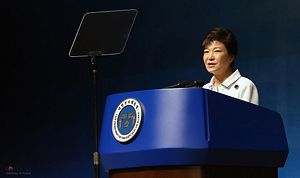Last week on this blog, Yong Kwon discussed South Korean President Park Geun-hye’s woes in trying to find a new prime minister.
As Yong explained, in April Prime Minister Jung Hong-won resigned after being designated as the scapegoat for the ferry disaster. Park nominated Ahn Dae-hee to replace Jung. However, late last month Ahn withdrew his name from consideration after coming under fire for abusing his former position as a Supreme Court justice for private material gain.
Last week President Park shocked everyone by nominating Moon Chang-keuk, the former editor-in-chief of the South Korean newspaper Joongang Daily, as her new nominee for prime minister. This was not without controversy, Yong noted. Some accused Park of undisguised political opportunism, while others—including the nominee himself—questioned Moon’s qualifications to hold such a senior post.
Most criticism, however, centered on the sometimes inflammatory positions Moon had taken in opinion articles. For example, Moon has compared Mayor Park Won-soon’s support for free school lunches to North Korea’s public distribution system. Perhaps more unforgivable, Moon has often expressed nostalgia for Park Chung-hee’s dictatorship rule.
All of this pales in comparison to the comments that have surfaced in recent days. To begin with, in April Moon reportedly told a group of college students that Japan should not apologize for Imperial Japan’s use of “comfort women” during WWII. Even more astonishing is a leaked video of Moon giving a speech in 2011 to a church in Yongsan. Per Robert Koehler of The Marmot’s Hole, in the video Moon says that Imperial Japan’s 35-year occupation of Korea was “God’s will” (Yonhap News Agency provides the same translation but Korea Real Time translates it slightly different, saying that Moon said that the occupation was “God’s message” to Korea.) Moon also said that the division of Korea following the war was also “God’s will” because it prevented the spread of communism. In addition, in April
The 2011 speech reportedly saw Moon defend the U.S.-backed Korean police and security forces’ brutal suppression of protesters on Jeju Island between 1948 and 1949. The crackdown is estimated to have killed tens of thousands of Koreans and destroyed many of the villages on the island. In 2003, then-President Roh Moo-hyun apologized to the victims of the clash. Still, the issue remains highly polarized in South Korea as some conservatives continue to maintain that the protests that preceded the crackdown were really a communist rebellion, as the government and the U.S. claimed at the time.
Moon’s comments have unsurprisingly caused outrage around the nation, particularly among the main opposition party, New Politics Alliance for Democracy, who is calling on Park to withdraw Moon’s nomination. The nominee himself has ruled out withdrawing his nomination or initially even refused to apologize for his comments.
He later expressed regret in a statement released by the prime minister’s office. In the statement, Moon said: “The speech could possibly have been distant from the sentiments of ordinary people as (I delivered) it inside the church. It is regrettable that misunderstanding has arisen because of this.”
The Park administration apparently intends to stand by the nominee. Unnamed South Korean officials told Yonhap on Sunday that a motion for Moon’s confirmation will be submitted to the National Assembly this week.
The stage is therefore set for a heated battle in the legislature over Moon’s nomination. Regardless of the outcome, the developments represent another in a long line of recent setbacks for Park’s increasingly embattled presidency.

































